 Backend Development
Backend Development
 PHP Tutorial
PHP Tutorial
 What is middleware? Listen to Miejieshi Taiqu talk about laravel middleware (picture)
What is middleware? Listen to Miejieshi Taiqu talk about laravel middleware (picture)
What is middleware? Listen to Miejieshi Taiqu talk about laravel middleware (picture)
What is middleware? Listen to Master Mieke talk about laravel middleware (picture)
This article mainly introduces what is middleware? I heard Miaojueshi Taiqu talk about laravel middleware (picture), which has a certain reference value. Now I share it with everyone. Friends in need can refer to it
What is middleware? As the name suggests, middleware is the middleware, the middle layer, that filters some requests, such as some simple token verification; the following article explains in detail the methods and techniques of defining middleware and registering middleware in Laravel.
1. Define middleware
The labeled laravel can be defined directly in the command
php artisan make:middleware CheckToken
This way it is created There is a middleware class called CheckToken. This class is in the /app/Http/Middleware directory:
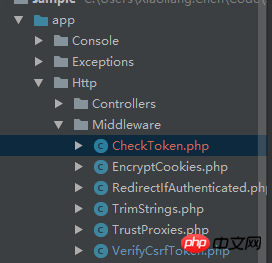
After clicking it, the code will look like this:
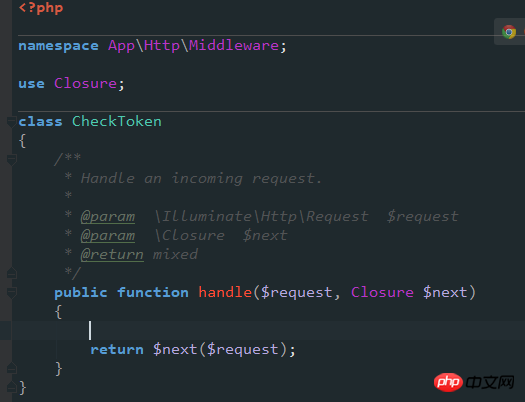
Then you can go and write something in it. For example:
public function handle($request, Closure $next)
{
if($request->input('token')!='minxintoken'){
return redirect()->to('http://www.baidu.com');
}
return $next($request);
}The meaning is obvious. If the 'token' field in the sent data is not equal to minxintoken, then it will automatically jump to http://www.baidu.com
Of course, so far, we have only created a middleware called CheckToken, but it has not been enabled; now let’s enable it;
2. Register the middleware
The so-called activation is to register this middleware into the specified route;
There are two types of registration, global middleware and specified route middleware,
1. Global Middleware:
As long as the corresponding middleware is added to the array attribute $middleware of app/Http/Kernel.php, it will be ok: (CheckToken::class written directly in the original text will not work and will report to App\Http\ CheckToken does not exist, you need to add the namespace of CheckToken.php to get the CheckToken correctly)
The correct answer is as follows:

Enter sample.test/ directly in the browser about will jump directly to www.baidu.com, but it won’t work like this:
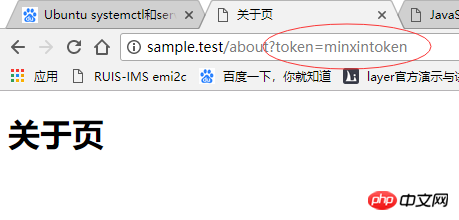
ok Global registration ends here. Generally speaking, global settings are not recommended. I don’t agree, because it is really annoying to bring the token every time;
2. Then let’s take a look at the middleware that specifies the route,
This kind of middleware To install the file, you first need to assign a key to the middleware in app/Http/Kernel.php and add it to $routeMiddleware in the file. There are already many default keys in it, just add one at the end:

After adding the key, go to the routing file and enable
Route::get('/','StaticPagesController@home')->middleware('token');
The effect of accessing the browser is to directly enter sample.test/ and it will be redirected to Baidu, and enter sample .test/?token=minxintoken can enter the homepage
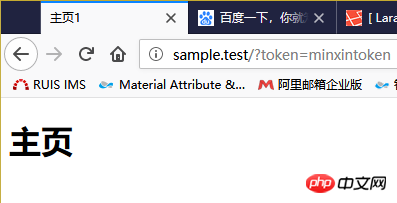
Of course, the disadvantage of this is that you have to tap a route to use it, which is not normal; so Another cool operation is that there is an array called $middlewareGroups in the Kernel.php file: We add the CheckToken we just created in the web,
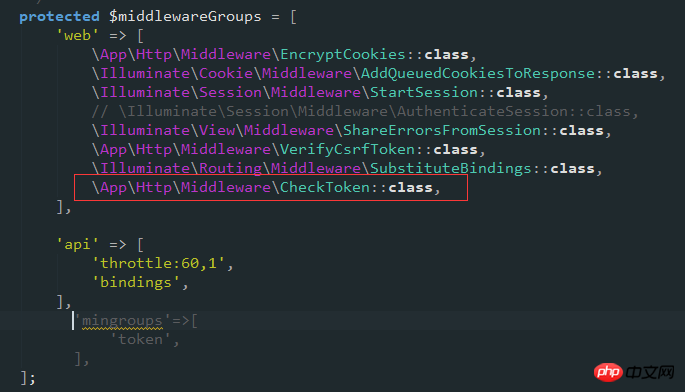
and then all The things in /route/web.php require token=minxintoken to access; for example, sample.test/ sample.test/about sample.test/help, etc.;
The above is the entire content of this article , I hope it will be helpful to everyone’s learning. For more related content, please pay attention to the PHP Chinese website!
Recommended courses:
The latest laravel mall practical video tutorial
Comprehensive interpretation of the Laravel framework and practical video tutorial
The above is the detailed content of What is middleware? Listen to Miejieshi Taiqu talk about laravel middleware (picture). For more information, please follow other related articles on the PHP Chinese website!

Hot AI Tools

Undresser.AI Undress
AI-powered app for creating realistic nude photos

AI Clothes Remover
Online AI tool for removing clothes from photos.

Undress AI Tool
Undress images for free

Clothoff.io
AI clothes remover

Video Face Swap
Swap faces in any video effortlessly with our completely free AI face swap tool!

Hot Article

Hot Tools

Notepad++7.3.1
Easy-to-use and free code editor

SublimeText3 Chinese version
Chinese version, very easy to use

Zend Studio 13.0.1
Powerful PHP integrated development environment

Dreamweaver CS6
Visual web development tools

SublimeText3 Mac version
God-level code editing software (SublimeText3)

Hot Topics
 Alipay PHP SDK transfer error: How to solve the problem of 'Cannot declare class SignData'?
Apr 01, 2025 am 07:21 AM
Alipay PHP SDK transfer error: How to solve the problem of 'Cannot declare class SignData'?
Apr 01, 2025 am 07:21 AM
Alipay PHP...
 How does session hijacking work and how can you mitigate it in PHP?
Apr 06, 2025 am 12:02 AM
How does session hijacking work and how can you mitigate it in PHP?
Apr 06, 2025 am 12:02 AM
Session hijacking can be achieved through the following steps: 1. Obtain the session ID, 2. Use the session ID, 3. Keep the session active. The methods to prevent session hijacking in PHP include: 1. Use the session_regenerate_id() function to regenerate the session ID, 2. Store session data through the database, 3. Ensure that all session data is transmitted through HTTPS.
 Explain JSON Web Tokens (JWT) and their use case in PHP APIs.
Apr 05, 2025 am 12:04 AM
Explain JSON Web Tokens (JWT) and their use case in PHP APIs.
Apr 05, 2025 am 12:04 AM
JWT is an open standard based on JSON, used to securely transmit information between parties, mainly for identity authentication and information exchange. 1. JWT consists of three parts: Header, Payload and Signature. 2. The working principle of JWT includes three steps: generating JWT, verifying JWT and parsing Payload. 3. When using JWT for authentication in PHP, JWT can be generated and verified, and user role and permission information can be included in advanced usage. 4. Common errors include signature verification failure, token expiration, and payload oversized. Debugging skills include using debugging tools and logging. 5. Performance optimization and best practices include using appropriate signature algorithms, setting validity periods reasonably,
 Describe the SOLID principles and how they apply to PHP development.
Apr 03, 2025 am 12:04 AM
Describe the SOLID principles and how they apply to PHP development.
Apr 03, 2025 am 12:04 AM
The application of SOLID principle in PHP development includes: 1. Single responsibility principle (SRP): Each class is responsible for only one function. 2. Open and close principle (OCP): Changes are achieved through extension rather than modification. 3. Lisch's Substitution Principle (LSP): Subclasses can replace base classes without affecting program accuracy. 4. Interface isolation principle (ISP): Use fine-grained interfaces to avoid dependencies and unused methods. 5. Dependency inversion principle (DIP): High and low-level modules rely on abstraction and are implemented through dependency injection.
 How to debug CLI mode in PHPStorm?
Apr 01, 2025 pm 02:57 PM
How to debug CLI mode in PHPStorm?
Apr 01, 2025 pm 02:57 PM
How to debug CLI mode in PHPStorm? When developing with PHPStorm, sometimes we need to debug PHP in command line interface (CLI) mode...
 How to automatically set permissions of unixsocket after system restart?
Mar 31, 2025 pm 11:54 PM
How to automatically set permissions of unixsocket after system restart?
Mar 31, 2025 pm 11:54 PM
How to automatically set the permissions of unixsocket after the system restarts. Every time the system restarts, we need to execute the following command to modify the permissions of unixsocket: sudo...
 Explain late static binding in PHP (static::).
Apr 03, 2025 am 12:04 AM
Explain late static binding in PHP (static::).
Apr 03, 2025 am 12:04 AM
Static binding (static::) implements late static binding (LSB) in PHP, allowing calling classes to be referenced in static contexts rather than defining classes. 1) The parsing process is performed at runtime, 2) Look up the call class in the inheritance relationship, 3) It may bring performance overhead.
 How to send a POST request containing JSON data using PHP's cURL library?
Apr 01, 2025 pm 03:12 PM
How to send a POST request containing JSON data using PHP's cURL library?
Apr 01, 2025 pm 03:12 PM
Sending JSON data using PHP's cURL library In PHP development, it is often necessary to interact with external APIs. One of the common ways is to use cURL library to send POST�...





